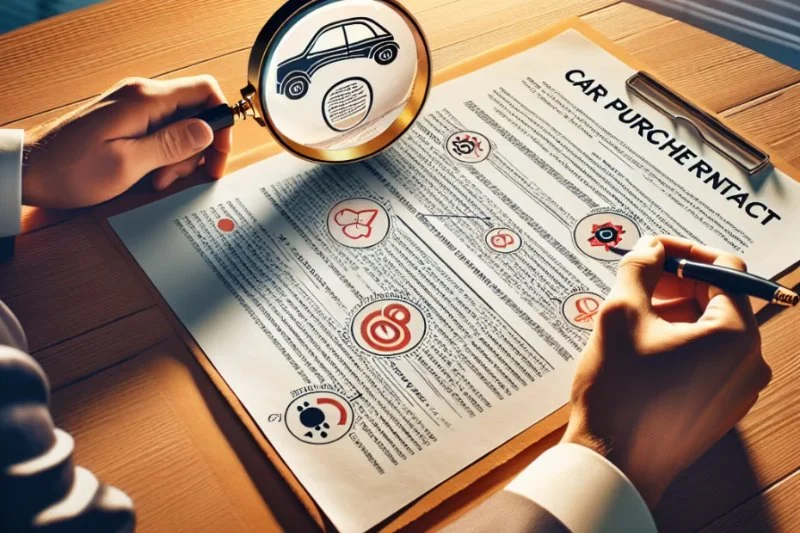
- 1. What to Look for in Rental Car Contracts
- 2. Key Terms in Rental Car Agreements
- 3. Understanding Rental Car Insurance Options
- 4. How to Avoid Hidden Fees in Rental Car Contracts
1. What to Look for in Rental Car Contracts
Rental car contracts can seem intimidating due to their dense legal language and the fine print. However, understanding the key components of a rental car agreement is essential to avoid unexpected costs and ensure a smooth rental experience.
When renting a car, it's crucial to carefully review the contract's terms before signing. Pay attention to the rental period, fuel policy, mileage restrictions, and terms regarding the car's condition. Most rental agreements will also include clauses outlining the rental company's responsibilities and your own, such as returning the car on time and maintaining its condition during the rental period.
2. Key Terms in Rental Car Agreements
To better understand what you’re agreeing to when renting a car, it's helpful to know the common terms and clauses included in rental car agreements. Here are some key terms that should always be checked:
Rental Period
The rental period is the duration for which you are renting the vehicle. Ensure that you specify the start and end dates, as well as any grace periods for returning the car. Some rental agencies may charge additional fees for extending the rental period, so it’s essential to be clear about your timeline.
Fuel Policy
Most rental companies will expect you to return the car with the same amount of fuel it had when you picked it up. If the car is returned with less fuel, the rental company will often charge you for refueling at a higher rate than the current pump price. Be sure to ask about the fuel policy when you rent the car to avoid any surprises.
Mileage Restrictions
Some rental contracts may have mileage limits, meaning you’ll be charged extra if you exceed the allotted distance. Always clarify whether your rental has unlimited mileage or if there are any restrictions. If you plan on taking long road trips, choosing a rental with unlimited mileage could save you money in the long run.
Vehicle Condition and Inspection
Before you drive off, always inspect the vehicle for any existing damage and report it to the rental company. Most rental contracts will hold you responsible for any damage incurred during the rental period, so it’s vital to document the car's condition before taking possession. This can protect you from being charged for pre-existing damages.
3. Understanding Rental Car Insurance Options
One of the most confusing aspects of renting a car is understanding the different insurance options available. While rental car insurance can provide peace of mind, it's important to know what’s included and what’s not. Here’s a breakdown of the most common types of coverage offered by rental agencies:
Collision Damage Waiver (CDW)
The Collision Damage Waiver (CDW) is a common insurance option that covers damage to the rental car in case of an accident. However, it’s important to note that CDW is not an actual insurance policy; it’s a waiver that limits the amount you’ll have to pay for damages. Check whether there is a deductible and if the CDW covers all types of damage, including vandalism or theft.
Liability Insurance
Liability insurance covers the cost of any damage you cause to other people or property while driving the rental vehicle. Some states require liability coverage, while others may leave it up to the renter to purchase. Always ensure you have adequate liability insurance, as it protects you in the event of an accident.
Theft Protection (TP)
Theft Protection is designed to cover the theft of the rental vehicle or any damage caused by a theft attempt. Like CDW, it may come with a deductible, so be sure to clarify the terms. If you're traveling in an area with a higher risk of car theft, adding this coverage could be a smart choice.
Personal Accident Insurance
Personal Accident Insurance (PAI) provides coverage for medical expenses in the event of an accident. It’s typically an optional add-on, and while it can be helpful, it’s worth checking if your personal health insurance or credit card provides similar coverage for rental cars.
4. How to Avoid Hidden Fees in Rental Car Contracts
Rental car agreements often include hidden fees that can quickly increase the total cost of your rental. To avoid these unexpected charges, here are some tips to keep in mind:
1. Check for Additional Insurance Costs
Rental companies often push additional insurance coverage, but many of these options may already be covered by your personal insurance or credit card. Before agreeing to any extra coverage, verify whether it’s necessary.
2. Look for Additional Charges
Watch out for charges like airport surcharges, toll fees, or cleaning fees. While some of these may be disclosed upfront, others can be added without your knowledge. Always ask for a breakdown of all potential charges before signing the contract.
3. Return the Car on Time
Late fees can be hefty, so make sure to return the rental car on time. Some companies offer grace periods, but it’s always safer to return the car early to avoid additional costs.
For a hassle-free rental experience, consider using services from LifeStar Car Rental, where we provide clear rental terms, a variety of vehicles, and transparent pricing to help you make informed decisions.









 Haboon Transportation llc5.0 (1 reviews)
Haboon Transportation llc5.0 (1 reviews) Enterprise Rent-A-Car4.0 (130 reviews)
Enterprise Rent-A-Car4.0 (130 reviews) Hertz Car Rental2.0 (4 reviews)
Hertz Car Rental2.0 (4 reviews) Budget Car Rental2.0 (27 reviews)
Budget Car Rental2.0 (27 reviews) AP Car Company5.0 (15 reviews)
AP Car Company5.0 (15 reviews) Enterprise Rent-A-Car4.0 (390 reviews)
Enterprise Rent-A-Car4.0 (390 reviews) Tips for Picking Up a Rental Car in Bad Weather and Avoiding Extra Risks
Tips for Picking Up a Rental Car in Bad Weather and Avoiding Extra Risks Why Premium Cars Are Becoming a Trend in U.S. Rental Markets
Why Premium Cars Are Becoming a Trend in U.S. Rental Markets Understanding the Fine Print of Rental Car Contracts: Key Things You Need to Know
Understanding the Fine Print of Rental Car Contracts: Key Things You Need to Know Tips for Veteran Drivers Renting Cars After Military Service
Tips for Veteran Drivers Renting Cars After Military Service How to Get the Best Deal When Renting a Car for a Road Trip During Fall Foliage Season
How to Get the Best Deal When Renting a Car for a Road Trip During Fall Foliage Season Why Some Rental Cars Have GPS Trackers and What It Means for You
Why Some Rental Cars Have GPS Trackers and What It Means for You